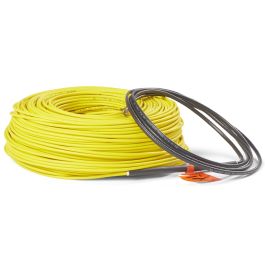With the harsh winter months fast approaching, many homeowners are looking for efficient and cost-effective ways to keep their homes warm. A heating cable is an excellent option for those who want to keep their pipes warm and avoid potential damage caused by frozen pipes. A resistance heating cable is a type of cable that is designed to generate heat through electrical resistance. In this blog, we will delve into the world of resistance heating cables and provide you with a comprehensive guide.

What is Resistance Heating Cable?
A resistance heating cable is a cable that can generate heat electrically. The cable is made of an alloy wire that has a high resistance to electric current, such as nickel-chromium. When an electric current flows through the wire, the electrical resistance generates heat, which is then transferred to the surroundings.
Types of Resistance Heating Cable
There are two primary types of resistance heating cables: self-regulating and constant wattage.
Self-Regulating Heating Cable
A self-regulating heating cable is a type of cable that changes its heat output according to the surrounding temperature. These cables are suitable for applications where constant temperature is necessary, such as freeze protection or floor heating. Self-regulating cables are also energy-efficient because they don't overheat and therefore don't waste energy.
Constant Wattage Heating Cable
A constant wattage heating cable is a type of cable that provides a fixed amount of heat output. Unlike self-regulating cables, constant wattage cables are suitable for applications where a consistent heat output is required, such as roof and gutter heating or industrial applications.
Benefits of Resistance Heating Cable
There are several benefits to using resistance heating cable:
1. Prevents frozen pipes: Resistance heating cables are commonly used to safeguard pipes against freezing, preventing potential pipe damage and costly repairs.
2. Energy-efficient: With self-regulating cables, you can save on your energy bills due to the cable only producing heat when necessary.
3. Versatile: Resistance heating cables come in different shapes and sizes, making them suitable for various applications, including roofs, gutters, and flooring.
4. Easy installation: Most heating cables, including resistance heating cables, are easy to install and require minimal maintenance.
Applications of Resistance Heating Cable
Resistance heating cables have a wide range of applications, including:
1. Freeze protection for pipes, valves, and tanks
2. Roof and gutter heating
3. Snow melting for driveways and sidewalks
4. Floor heating for homes and offices
5. Industrial heating and process temperature maintenance
Conclusion
Resistance heating cables are versatile, energy-efficient, and easy to install, making them an excellent option for homeowners looking to keep their homes warm throughout the winter months. Whether you need to prevent pipes from freezing or melt snow from your driveway, there's a resistance heating cable available that will suit your needs. If you're looking for an efficient and cost-effective way to keep your home warm, consider investing in a resistance heating cable.